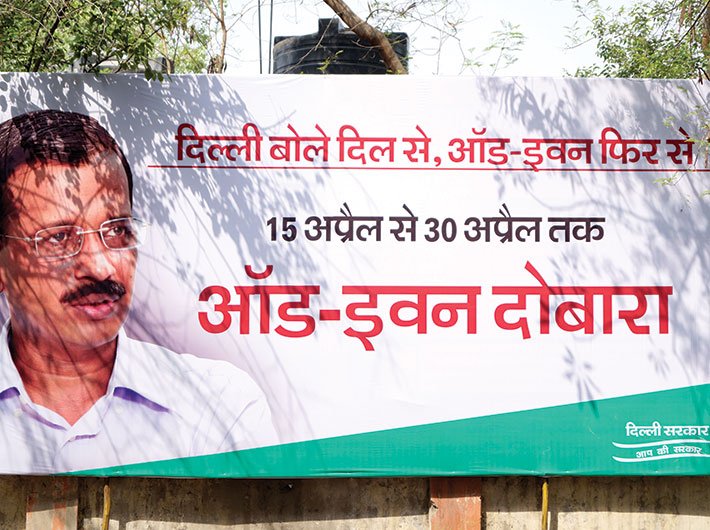The capital readies for the second innings of the controversial odd-even scheme, but the jury is out on its effectiveness
Delhi, a city with the foulest air in the world and currently home to an estimated 17 million people, will see a second round of road rationing during April 15-30. However, opinions are sharply divided on whether such a move will actually lead to cleaner air.
One group of experts is all for a repeat of the scheme for the relief it gives to people from road congestion, reduced pollution levels and dramatic fall in the number of patients with wheezing and coughing flocking to clinics and hospitals. The other school of thought, however, feels that the scheme had made no dramatic change when it was implemented in January.
Anumita Roy Chowdhury, executive director, research and advocacy, Centre for Science and Environment (CSE), says, “Half the vehicles going off the roads will reduce toxic exposure. There are benefits of car restraint measures, with improvement in quality of life.” However, she feels a lot more needs to be done. “Odd-even gives you immediate relief,” she adds.
Roy Chowdhury prefers more long-term systemic solutions like improvement in public transport, a parking policy and taxation measures. For her, the gains of odd-even spell should be sustained. In the first phase of the odd-even scheme which was in winter, the exposure to toxic fumes was considerably reduced; and as the second phase falls in summer, it will lead to control of gaseous ozone pollution.
But not everyone is buying the argument. “There was no measurable improvement in pollution levels during the first phase of the odd-even scheme,” professor Dinesh Mohan, emeritus fellow at Indian Institute of Technology, Delhi, says.
He cites an IIT study to say that there was 5-10 percent increase in traffic speed in the afternoons in the first phase. Also, more use of autorickshaws and buses during that period led to “increase in the potential for accidents” and “offset the reduced car use”. A long-term solution, he says, would be to ensure a switch to Euro-VI compliance.
Delhi’s attempt to deal with life threatening pollution levels through the odd-even road traffic is akin to the model tried in Mexico City, Beijing and Bogota City.
A report in the international journal of academic research shows that Delhi has more vehicles than the combined fleet of Mumbai and Pune.
For the Aam Aadmi Party (AAP) government, the first phase was a success. AAP’s Arunoday Prakash is hopeful that the second phase of the scheme will make Delhi “pollution free and congestion free”. He says, “We were happy to see the results of the first phase of the odd-even scheme. It dramatically brought down vehicular congestions. A distance which used to take an hour to traverse took barely 20 minutes then. We hope to see a repeat of its success.”
Though the exemption to women drivers, CNG-fuelled vehicles, emergency vehicles and VIPs continues in the second phase, the new exemption to parents for ferrying children from and to schools is likely to create confusion.
The issue of allowing women to drive saw considerable debate, with some women not wanting any exemption, while others stressing on women’s safety.
According to the ministry of road transport and highways, in Delhi there are a little over 2,50,000 women having a driving licence.
Interestingly, the central government, which is at loggerheads with the AAP government, does not seem too keen for a repeat of the odd-even scheme. Union urban development minister M Venkaiah Naidu said on April 7: “Imposition of odd-even day restrictions on vehicles in Delhi is a consequence of unsustainable urban development practices followed over the years and all stakeholders need to draw lessons from it.”
The odd-even scheme announcement by Delhi chief minister Arvind Kejriwal on April 9 saw its own share of drama when a man hurled a shoe at him.
Kejriwal also announced the launch of a helpline number for the odd-even scheme.
Delhi’s transport minister Gopal Rai told reporters that the air quality will be monitered at 119 locations and ex-servicemen will help in enforcement of the odd-even scheme.
While the odd-even scheme looks promising, it does pose quite a challenge for car users, specially those who have to frequently travel during the day.
Amitabh Sharma, who travels from Noida to Gurgaon every day, says that during the odd-even days he had to car pool. “Car pool looks like a good proposition, but marketing professionals like me find it difficult as we have to meet clients in Delhi.” He says that the only way out for him was to hire a cab.
Sandeep Bhatia, who stays in Gagan Vihar in Delhi and travels to Noida, says that he had a difficult time during the period when the scheme was in force in January. “There were days when I booked a cab, but after a few minutes I would get a message that my booking has been cancelled,” he says.
Not just men, women who have drivers faced similar problems. Shalini Srivastava, who lives in Vasundhara and works at HCL, but doesn’t know how to drive, says that she could not use her car half the time as she has a male driver.
“I am a woman but the scheme left me stumped. I was forced to tie up with other colleagues,” she says. She expressed concern that this time too it will not be much different.
The public transport system in Delhi is already overcrowded, with passengers packed like sardines in metro trains and buses. To complicate the matter, there are frequent breakdown of buses, especially during summer.
While passengers are more receptive to taking a public transport during winter, the scenario may be different during summer when the mercury soars.
To ensure success of the scheme, active participation of the people is the key. Stringent measures coupled with enthusiastic residents can ensure that the national capital can breathe easy. n
rahul@governancenow.com
(This article was published in April 16-30, 2016 edition)

